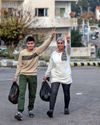
A few years ago, as age began to take its toll, Rosa Velásquez decided it was time to retire from her restaurant in the coastal town of Cabo de la Vela and move back home. However, when she returned to her tiny rural community of Jotomana, on the arid plains of Colombia's northernmost tip, she found the place she and her ancestors had called home for generations littered with giant wind turbines.
Towering white turbines punctuate the horizon a few kilometres from Cabo de la Vela. The region, in the northern state of La Guajira, is home to all of Colombia's windfarms and its largest Indigenous population, the Wayúu.
"We live among turbines. The companies like them, but I don't. Where am I to go if this is my territory? What are my grandchildren going to do once I die?" asked Velásquez, a Wayúu herself, as goats roam around her property under the blistering sun.
La Guajira, Colombia's second-poorest state, has become the focal point and battleground of the government's proposed energy transition, a push to develop renewable energy sources and reduce its dependency on oil and coal to tackle the climate crisis.
According to La Guajira's chamber of commerce, the state has solar radiation levels 60% higher than the national average and wind speeds double the global norm. Private companies and Colombia's mines and energy ministry had sought to capitalise on these factors-even before Gustavo Petro's leftist government set out its ambitions for a "just energy transition".
The renewables sector could see investments reach $2.2bn this year, much of that being funnelled into the region. La Guajira has 17 renewable energy projects in development, with plans for dozens more to follow -including many offshore windfarms.
Denne historien er fra April 12, 2024-utgaven av The Guardian Weekly.
Start din 7-dagers gratis prøveperiode på Magzter GOLD for å få tilgang til tusenvis av utvalgte premiumhistorier og 9000+ magasiner og aviser.
Allerede abonnent ? Logg på
Denne historien er fra April 12, 2024-utgaven av The Guardian Weekly.
Start din 7-dagers gratis prøveperiode på Magzter GOLD for å få tilgang til tusenvis av utvalgte premiumhistorier og 9000+ magasiner og aviser.
Allerede abonnent? Logg på

Out of touch How president sealed his own fate in martial law gambit
For Yoon Suk Yeol, this month's short-lived martial law declaration wasn't just a catastrophic miscalculation - it was the culmination of a presidency that had been troubled from the start.

Son of the soil Who is François Bayrou, the farmer turned prime minister?
François Bayrou, the new French prime minister, calls himself a country man. A tractor-driving \"son of the soil\" and breeder of thoroughbreds, he has run for president three times, saying his rural roots and centrist politics led him to try to find common ground between left and right.

Power plant workers keeping the lights on
The Guardian Weekly visits a Soviet-era coal-fired thermal installation to learn how it has held up to Russian attacks

Prince charmed Alleged spy scandal may have exposed China threat
Prince Andrew should be commended for doing Britain a great service, according to longstanding China watcher Charles Parton. The now marginalised royal has, the analyst observed, \"almost single handedly\" succeeded \"in highlighting the threat to free and open countries\" posed by the contemporary Chinese state.

In Moscow, a new life of secluded irrelevance awaits Assad
He was whisked away without a last message to his people, the aircraft's transponder deliberately switched off to avoid detection as it departed from an airbase in Syria.

'We fear new oppression' Alawites worry over rebel rule
To prepare khubeiza, the leaves of the kale-like plant must be roughly chopped and sauteed with onions, garlic and a dash of salt. According to folklore, the recipe originated among the Alawite communities who lived in Syria's mountainous coastline where the fibrous, wild-growing plant can be found in abundance. So poor were the Alawites in Ottoman times, the story goes, that the only food they could find to eat was khubeiza, which sprouts like a stubborn weed every spring.

'Gisèle is waiting for explanations'
The Pelicot rape trial has horrified the world. But as it comes to an end, the questions it has raised about French society and rape culture have still not been answered.

FROM DOCTOR TO BRUTAL DICTATOR THE RISE AND FALL OF ASSAD
0N THE FACE OF IT AT LEAST, the Bashar al-Assad of 2002 presented a starkly different figure from the brutal autocrat he would become, presiding over a fragile state founded on torture, imprisonment and industrial murder.

What fresh alternatives can be used to placate coriander haters?
Everyone knows a hater of coriander - also known as cilantro - who won't go near the stuff. Itamar Srulovich, however, is not one: \"I adore fresh coriander, and always have,\" says the chef/co-owner of the Honey & Co group in London.

Farage is lying in wait.Britain cannot afford to see Starmer fail Jonathan Freedland
This government must not fail. Let's get that clear from the start. If Keir Starmer does not succeed, too many British voters will conclude that both the traditional parties, Labour and Conservative, have proved useless and that it is time to try something else with that something else being nationalist populism.